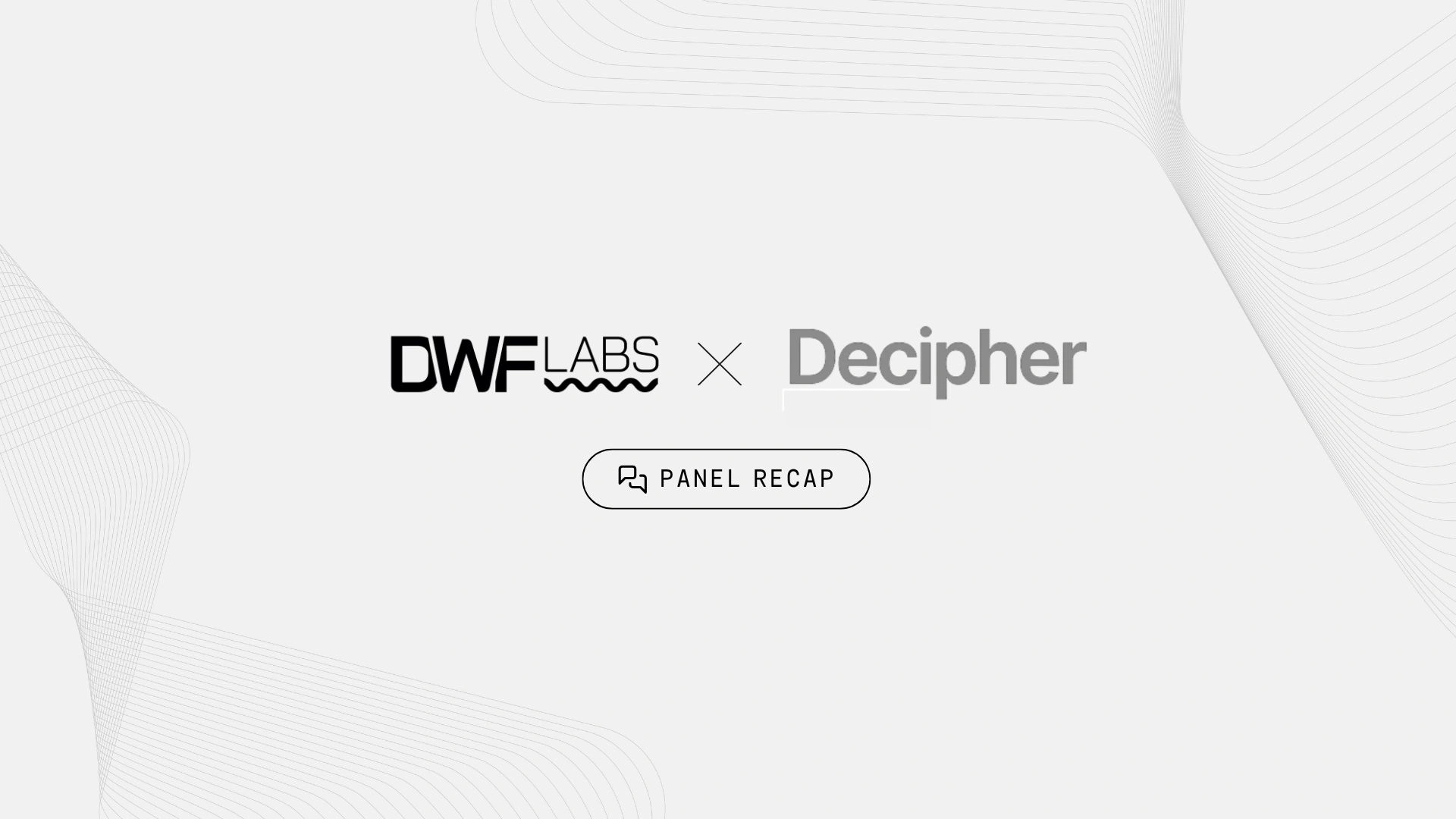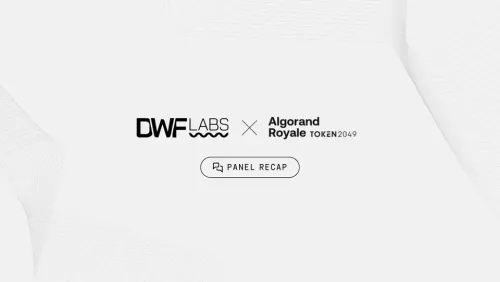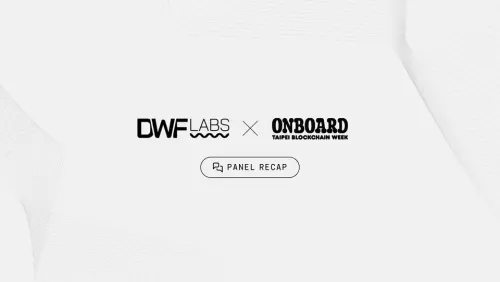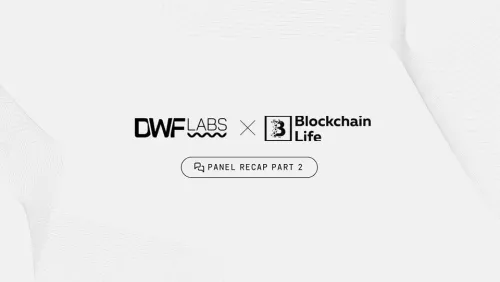On 26 June 2024, Alessia Baumgartner, VP of Ecosystems at DWF Labs, joined a panel discussion at the Decipher crypto conference. The panel titled “Do You Have What It Takes? What We Look for When Funding Web3 Businesses” brought together industry leaders to share their perspectives on identifying promising projects and navigating the competitive Web3 investment landscape.
Moderated by Daniel Yang of the Algorand Foundation, the event included Alessia Baumgartner from DWF Labs, Richard Skeet from Hivemind Capital, AJ Mill from Optio Capital, and Venit Botki from Cypher Capital.
Together, they discussed the key elements that crypto investors prioritise when evaluating potential investments.
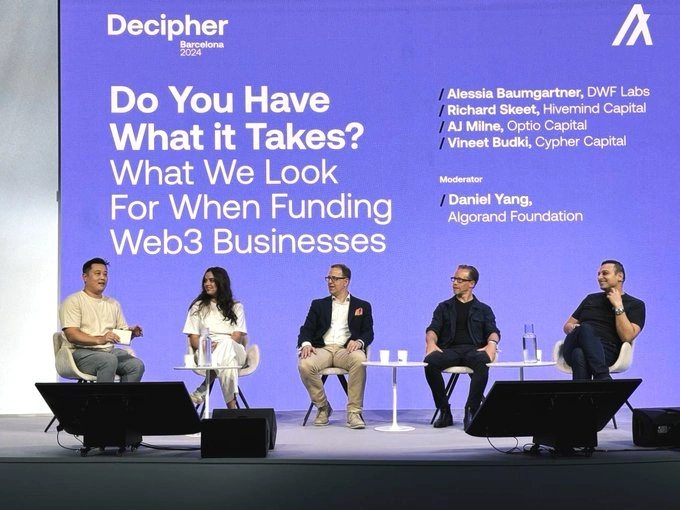
Setting the Stage
Alessia Baumgartner emphasised the importance of a strong, concise pitch deck for a crypto venture capital firm that captures the essence of a project within the first two minutes. “In a space as dynamic as crypto, clarity and impact are key,” she noted. A well-structured pitch deck should highlight the project’s ethos, technical aspects, and vision without overloading it with unnecessary details, such as lengthy explanations of crypto’s value proposition.
Traits of Successful Teams
Adaptability, technical expertise, and resilience were identified as key traits for successful founders. Alessia explained that in a volatile market, adaptability is crucial. “Trends evolve quickly, and founders must pivot their strategies to align with new opportunities and challenges.”
Richard Skeet added, “Founders with a clear North Star and fundamental first-principles thinking often stand out. Their ability to articulate why their project matters and how it will deliver value is critical.”
Baumgartner also highlighted technical expertise as a vital trait that crypto venture capitalists look after, even for non-technical leaders. “A CEO must have a technical grasp of their Web3 project to effectively guide their team.”
Relationships with a Crypto VC: Beyond the First Impression
The panelists agreed that while first impressions matter, maintaining relationships with crypto VCs is equally important. DWF Labs’s representative stressed the need for professionalism, noting that punctuality and preparation are key. “This industry is small. Your reputation follows you,” she remarked.
Richard emphasised transparency: “You only sell your integrity once. If a VC discovers false claims in your pitch—such as fabricated partnerships or achievements—it’s an immediate red flag.”
Venit Botki pointed out the importance of staying engaged with investors, even after an initial rejection. “Send regular updates on your progress. A ‘no’ today doesn’t mean ‘no’ forever, especially if your project evolves and demonstrates traction,” he said.
Avoiding Common Mistakes
The panel identified frequent errors made by founders when interacting with crypto venture capital funds, including:
- Overcomplicating their pitch: Baumgartner advised founders to simplify their messaging to ensure VCs quickly understand the problem they are solving and the solution they offer.
- Neglecting KPIs: Metrics such as network activity, community engagement, and user growth are critical for demonstrating a project’s viability.
- Lack of an MVP: “A working MVP speaks volumes,” AJ Mill stated. “It shows you’ve moved beyond an idea and into execution.”
Should Web3 Founders Moonlight or Commit Fully?
The panel had differing opinions on whether founders should work on their projects full-time. Alessia Baumgartner expressed understanding for founders bootstrapping their ventures alongside a day job but stressed the need to demonstrate commitment and work ethic.
Venit took a firmer stance, saying, “Building a startup requires total focus. If you’re only working part-time, it’s hard to convince investors you’re serious.”
Closing Thoughts
DWF Labs remains actively engaged in investing crypto venture capital across various project stages, from pre-seed to later-stage funding. Alessia Baumgartner highlighted the firm’s openness to projects across verticals, emphasising their chain-agnostic approach. “Our focus is on the quality of the founders and their vision, regardless of the sector,” she said.
We are always open to meeting new founders and exploring innovative ideas. For additional resources and updates, follow DWF Labs on X and explore their Telegram channel.
To connect with DWF Labs, founders can reach out via the official website, or directly at events like Decipher.
